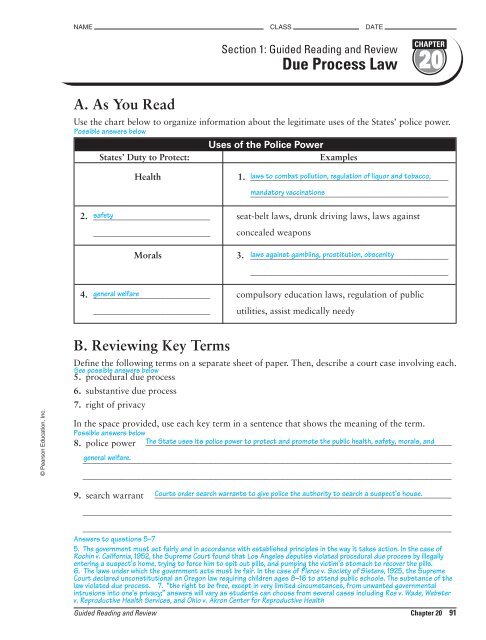0130679593
0130679593
0130679593
Create successful ePaper yourself
Turn your PDF publications into a flip-book with our unique Google optimized e-Paper software.
NAME CLASS DATE<br />
Section 1: Guided Reading and Review<br />
Due Process Law<br />
CHAPTER<br />
20<br />
A. As You Read<br />
Use the chart below to organize information about the legitimate uses of the States’ police power.<br />
Possible answers below<br />
Uses of the Police Power<br />
States’ Duty to Protect:<br />
Examples<br />
Health<br />
1. laws ____________________________________________<br />
to combat pollution, regulation of liquor and tobacco,<br />
____________________________________________<br />
mandatory vaccinations<br />
2. safety __________________________ seat-belt laws, drunk driving laws, laws against<br />
__________________________ concealed weapons<br />
Morals<br />
3. laws ____________________________________________<br />
against gambling, prostitution, obscenity<br />
____________________________________________<br />
4. general __________________________ welfare<br />
compulsory education laws, regulation of public<br />
__________________________ utilities, assist medically needy<br />
© Pearson Education, Inc.<br />
B. Reviewing Key Terms<br />
Define the following terms on a separate sheet of paper. Then, describe a court case involving each.<br />
See possible answers below<br />
5. procedural due process<br />
6. substantive due process<br />
7. right of privacy<br />
In the space provided, use each key term in a sentence that shows the meaning of the term.<br />
Possible answers below<br />
8. police power ____________________________________________________________________<br />
The State uses its police power to protect and promote the public health, safety, morals, and<br />
__________________________________________________________________________________<br />
general welfare.<br />
__________________________________________________________________________________<br />
9. search warrant __________________________________________________________________<br />
Courts order search warrants to give police the authority to search a suspect’s house.<br />
__________________________________________________________________________________<br />
__________________________________________________________________________________<br />
Answers to questions 5–7<br />
5. The government must act fairly and in accordance with established principles in the way it takes action. In the case of<br />
Rochin v. California, 1952, the Supreme Court found that Los Angeles deputies violated procedural due process by illegally<br />
entering a suspect’s home, trying to force him to spit out pills, and pumping the victim’s stomach to recover the pills.<br />
6. The laws under which the government acts must be fair. In the case of Pierce v. Society of Sisters, 1925, the Supreme<br />
Court declared unconstitutional an Oregon law requiring children ages 8–16 to attend public schools. The substance of the<br />
law violated due process. 7. “the right to be free, except in very limited circumstances, from unwanted governmental<br />
intrusions into one’s privacy;” answers will vary as students can choose from several cases including Roe v. Wade, Webster<br />
v. Reproductive Health Services, and Ohio v. Akron Center for Reproductive Health<br />
Guided Reading and Review Chapter 20 91


